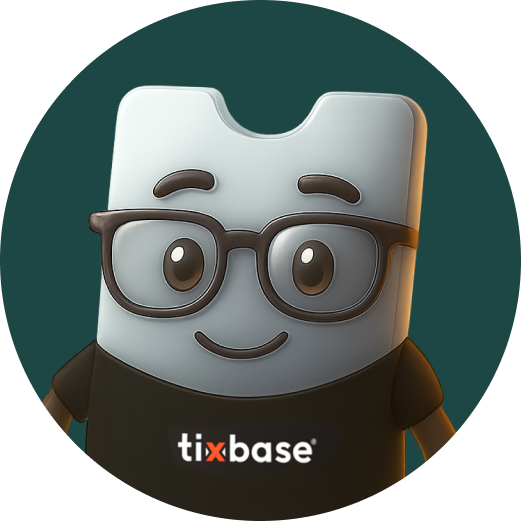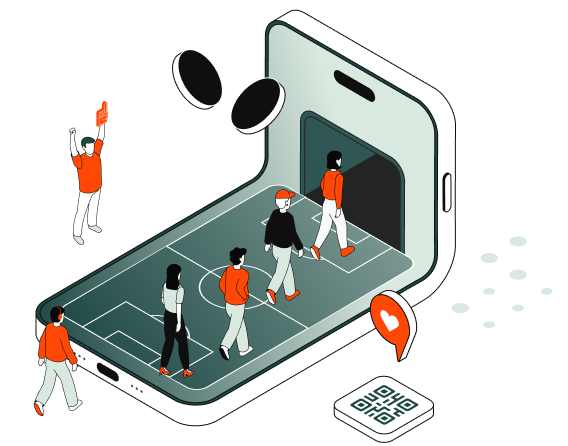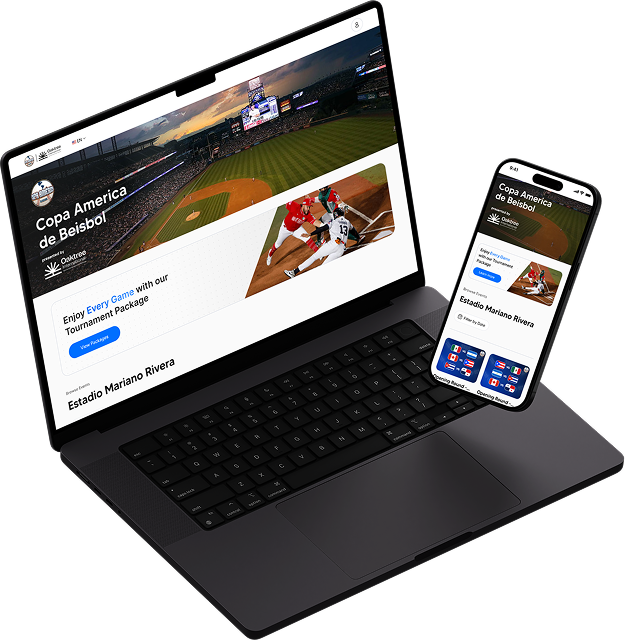Tickets Are More Than Just Entries
.png)
If you want to go to a stadium to watch a concert or a football match, you need a ticket. If you want to laugh a little while watching a comedy at the theater, you need a ticket to get in. If you want to attend a lecture reserved for a limited audience, you also need a ticket - even if it is free. The ticket is your access to all the experiences you want to live at that particular moment around a certain theme.
But what is a ticket, really? Much more than just access, a ticket carries valuable information that goes far beyond the event’s name, the price, the date, and the section you are entering.
From paper to QR codes, from PDFs sent by email to facial biometrics, tickets are in fact the starting point of the relationship between the event organizers and their fans. This relationship may repeat at different frequencies, but ultimately it represents a wonderful opportunity for connection, for the exchange of information, and for turning the fan experience into a true 360° universe.
In reality, everything starts two steps earlier, when you decide to purchase tickets for a certain event. With the technology developed over the last 20 years, buying tickets has become a less traumatic experience compared to the huge lines at the box office. Yet, it still carries a strong dose of disappointment due to online queues, inflated prices charged by digital scalpers, and, in some cases, the frustrating experience of buying a counterfeit ticket.
Online purchase assumes that we have a digital environment where the customer logs in, registers, and from there selects their tickets.
This is where our article truly begins. By registering - whether or not they complete the purchase - the customer leaves behind their data… DATA!!! Unlike in the past, data can no longer be sold, but it can indeed be organized, worked on, and enriched so that we can learn more and more about these customers, gaining deeper insights into their habits and consumption desires. In addition, we can bring brands closer in an intelligent way, segmenting audiences and products. Sports become more than entertainment.
But let’s go back to tickets. At the moment of purchase, the customer indicates the path they prefer to follow in their experience. If they want the ticket by email, they must provide their address. If they want to receive the QR code on their phone, they must provide their number, which can be used to send a link via WhatsApp or to download an app.
Notice that all paths lead you to the customer - and these paths are opened by the customer themselves when they communicate with the event organizer through the ticketing company. This is the first miracle of Ticketing: Connection!
From here, we can clearly see two possible paths in the relationship with fans/customers.
The first path, a bit more limited and less costly, allows us, through organized data, to conduct CRM work whose goal is simply to feed ticket sales. At most, it can be connected to a loyalty program, such as a membership program for fans, exploring the offer of differentiated products to different supporter profiles. For example, offering packages or converting them into official members, establishing a deeper relationship where the customer begins to purchase two products from the club. Still within this model, surveys about tickets can be conducted to enrich the database and improve future offerings.
The second path is broader, more challenging, and has immense capacity to transform the customer’s 360° universe with product and service offerings like never before. In this path, the data generated from ticket sales is transmitted or stored in a large, integrated Data Lake - not only with the ticketing platform but also with several other customer relationship platforms. In football, for instance, this can include e-commerce, fan membership programs, physical stores, OTT, apps, and even the club’s museum. And it doesn’t stop there. Online surveys - at very low cost - can reward fans for their participation and can be developed around various themes and segments, expanding both the base and the richness of customer information, while attracting sponsors to tap into the same data source. One of the ways to access such surveys could be through a link embedded in the digital ticket, easily available in the customer’s wallet.
But as the title says, the ticket is much more than just entry. It indicates that on a specific date, you intend to be in a specific place, alone or accompanied, in a VIP area or a more basic one.
On the big day, the ticket tells event organizers whether you are actually present and the exact moment you entered the venue. What a magical opportunity to welcome fans, isn’t it? An entire strategy can be built to connect with the fan at this magical moment of arrival, offering opportunities and products right there in the heat of the experience. Moreover, since everything is recorded and stored in a digital environment, the work can continue according to the strategy defined, with clear business rules and relationship guidelines. This marketing work can even be offered to partner brands, in a parallel strategy where the club’s products and services are offered simultaneously with those of commercial partners throughout the partnership.
But it doesn’t end there. What if, for some reason, the customer cannot attend on the big day? What will they do with their ticket? The answer is no longer losing it or resorting to scalping. Through an official platform, without abusive prices, you can put your ticket up for RESALE, recovering up to 100% of its value, while giving another person the chance to buy it safely and reliably - paying the same original price, plus only a service fee charged at purchase.
In this case, returning to the topic of data, we now gain not only information that the first customer decided not to attend and resold their ticket, but also information about the new customer who purchased the ticket through this process. Whether the resale was done through the app or on a desktop, that too is tracked. This information becomes valuable when analyzing customer relationship channels.
And there’s more. On the digital ticket, stored in the customer’s mobile wallet, brands of event sponsors can be displayed with links leading to specific promotions accessible during or after the event, depending on the promotional strategy.
It becomes very clear for those who work in the sports and entertainment market that ticketing companies can play a much more relevant role than simply selling and reselling tickets securely. They can be true providers of information and business strategy, serving their clients either with dedicated teams according to the paths mentioned above, or by offering training, capacity building, and insights about ticketing operations.
Tickets are the gateway to a new era of fan relationships.
If you want to go to a stadium to watch a concert or a football match, you need a ticket. If you want to laugh a little while watching a comedy at the theater, you need a ticket to get in. If you want to attend a lecture reserved for a limited audience, you also need a ticket - even if it is free. The ticket is your access to all the experiences you want to live at that particular moment around a certain theme.
But what is a ticket, really? Much more than just access, a ticket carries valuable information that goes far beyond the event’s name, the price, the date, and the section you are entering.
From paper to QR codes, from PDFs sent by email to facial biometrics, tickets are in fact the starting point of the relationship between the event organizers and their fans. This relationship may repeat at different frequencies, but ultimately it represents a wonderful opportunity for connection, for the exchange of information, and for turning the fan experience into a true 360° universe.
In reality, everything starts two steps earlier, when you decide to purchase tickets for a certain event. With the technology developed over the last 20 years, buying tickets has become a less traumatic experience compared to the huge lines at the box office. Yet, it still carries a strong dose of disappointment due to online queues, inflated prices charged by digital scalpers, and, in some cases, the frustrating experience of buying a counterfeit ticket.
Online purchase assumes that we have a digital environment where the customer logs in, registers, and from there selects their tickets.
This is where our article truly begins. By registering - whether or not they complete the purchase - the customer leaves behind their data… DATA!!! Unlike in the past, data can no longer be sold, but it can indeed be organized, worked on, and enriched so that we can learn more and more about these customers, gaining deeper insights into their habits and consumption desires. In addition, we can bring brands closer in an intelligent way, segmenting audiences and products. Sports become more than entertainment.
But let’s go back to tickets. At the moment of purchase, the customer indicates the path they prefer to follow in their experience. If they want the ticket by email, they must provide their address. If they want to receive the QR code on their phone, they must provide their number, which can be used to send a link via WhatsApp or to download an app.
Notice that all paths lead you to the customer - and these paths are opened by the customer themselves when they communicate with the event organizer through the ticketing company. This is the first miracle of Ticketing: Connection!
From here, we can clearly see two possible paths in the relationship with fans/customers.
The first path, a bit more limited and less costly, allows us, through organized data, to conduct CRM work whose goal is simply to feed ticket sales. At most, it can be connected to a loyalty program, such as a membership program for fans, exploring the offer of differentiated products to different supporter profiles. For example, offering packages or converting them into official members, establishing a deeper relationship where the customer begins to purchase two products from the club. Still within this model, surveys about tickets can be conducted to enrich the database and improve future offerings.
The second path is broader, more challenging, and has immense capacity to transform the customer’s 360° universe with product and service offerings like never before. In this path, the data generated from ticket sales is transmitted or stored in a large, integrated Data Lake - not only with the ticketing platform but also with several other customer relationship platforms. In football, for instance, this can include e-commerce, fan membership programs, physical stores, OTT, apps, and even the club’s museum. And it doesn’t stop there. Online surveys - at very low cost - can reward fans for their participation and can be developed around various themes and segments, expanding both the base and the richness of customer information, while attracting sponsors to tap into the same data source. One of the ways to access such surveys could be through a link embedded in the digital ticket, easily available in the customer’s wallet.
But as the title says, the ticket is much more than just entry. It indicates that on a specific date, you intend to be in a specific place, alone or accompanied, in a VIP area or a more basic one.
On the big day, the ticket tells event organizers whether you are actually present and the exact moment you entered the venue. What a magical opportunity to welcome fans, isn’t it? An entire strategy can be built to connect with the fan at this magical moment of arrival, offering opportunities and products right there in the heat of the experience. Moreover, since everything is recorded and stored in a digital environment, the work can continue according to the strategy defined, with clear business rules and relationship guidelines. This marketing work can even be offered to partner brands, in a parallel strategy where the club’s products and services are offered simultaneously with those of commercial partners throughout the partnership.
But it doesn’t end there. What if, for some reason, the customer cannot attend on the big day? What will they do with their ticket? The answer is no longer losing it or resorting to scalping. Through an official platform, without abusive prices, you can put your ticket up for RESALE, recovering up to 100% of its value, while giving another person the chance to buy it safely and reliably - paying the same original price, plus only a service fee charged at purchase.
In this case, returning to the topic of data, we now gain not only information that the first customer decided not to attend and resold their ticket, but also information about the new customer who purchased the ticket through this process. Whether the resale was done through the app or on a desktop, that too is tracked. This information becomes valuable when analyzing customer relationship channels.
And there’s more. On the digital ticket, stored in the customer’s mobile wallet, brands of event sponsors can be displayed with links leading to specific promotions accessible during or after the event, depending on the promotional strategy.
It becomes very clear for those who work in the sports and entertainment market that ticketing companies can play a much more relevant role than simply selling and reselling tickets securely. They can be true providers of information and business strategy, serving their clients either with dedicated teams according to the paths mentioned above, or by offering training, capacity building, and insights about ticketing operations.
Tickets are the gateway to a new era of fan relationships.




.png)














